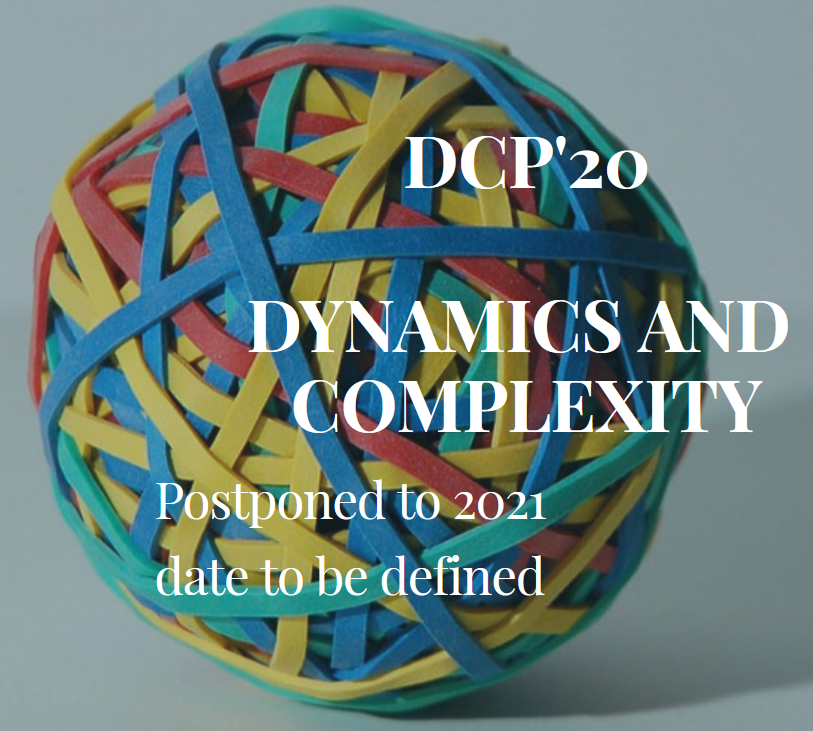WORKSHOP DCP’20 – DYNAMICS AND COMPLEXITY Postponed to 2021 date to be defined
WORKSHOP DCP’20 – DYNAMICS AND COMPLEXITY
Postponed to 2021 date to be defined
Area della Ricerca del CNR di Pisa Via Moruzzi, 1

The Dynamics and Complexity workshop will be held in the CNR research campus of Pisa on September 2020. The main aim of DCP20 is to discuss some of the most important current researches on complex systems, with a particular focus on interdisciplinary research areas ranging from physics and mathematics to biology and psycology.
The study of the long-term behaviour of natural phenomena is the main objective of the application of the methods of dynamical systems. Many natural phenomena are described by nonlinear models exhibiting sensitive dependent on initial conditions. Therefore, the impossibility to predict the long-term behaviour of individual orbits leads us to investigate the behaviour of such systems using Ergodic theory. In this framework, one of the aims of DCP20 will be promoting a presentation and a discussion of the current approaches to study the long term behaviour of dynamical systems using ideas from random dynamical systems and linear response theory.
Another interesting topic, of the current researches on complex systems, concerns the study of economics dynamical systems. As such, also this interesting research line will be present within DCP20.
Complex systems are ubiquitously and characterized by the nonlinear interaction of its constituents, thus triggering the emergence of self-organized structures. In many research fields it has become possible to get simultaneous observations with high time/space resolution, e.g., neural networks (in vivo or in vitro), single particle tracking in biological systems such as cell cytoplasm and membrane, social and economic networks. In this sense, COMPLEXITY science is nowadays often referred to the development of reliable and accurate statistical tools being able to extract information from a large amount of data. A great effort is being devoted to the so-called knowledge discovery (data mining, artificial intelligence), devoted to find recurrences and correlations and, in general, self-organization in the datasets. The main goal is to derive statistical indices that are both synthetic and informative.
A great challenge is the development of models and statistical tools being able to extract the causal relationships among variables. Thus, the focus of the scientific community is moving towards the investigation of the internal DYNAMICS generating the dataset in order to develop modelling tools that are not only descriptive but also temporally predictive.
The main aim of the workshop is that of showing the importance of multidisciplinary and unifying approaches for the investigation of complex systems. Another important objective of DCP20 is to point out the importance of the use of new and innovative approaches for the study of nonlinear dynamical systems. The workshop will be organized in different topical sections, each comprising a series of specific talks on some of the ongoing and more promising researches lines on complex systems.
We encourage the submission of works concerning the investigation, either theoretical, methodological, or experimental, of complex multi-component systems, with particular focus on the dynamical modelling. Methods and models may include (but are not limited to): stochastic modelling, nonlinear dynamical systems, mono-/multi-scaling analysis, fractals and multi-fractals, long-range memory (non-Markovian processes, Lévy flights and walks), anomalous diffusion, fractional models, critical phenomena, Self-Organized Criticality, complex network analysis, data mining, artificial intelligence, bioinformatics.
Organizer
Angelo Di Garbo, Stefano Galatolo,Riccardo Mannella, Paolo Paradisi
Scientific Committee
Angelo Di Garbo, Stefano Galatolo,Riccardo Mannella, Paolo Paradisi,Alessandro Pingitore, Enrico Cataldo,Fabio Vanni
Technical Committee
Marco Carloni, Alessandro Puntoni, Rosa Anna Claps, Rosanna Cascone, Claudia Neri, Davide Nardi
